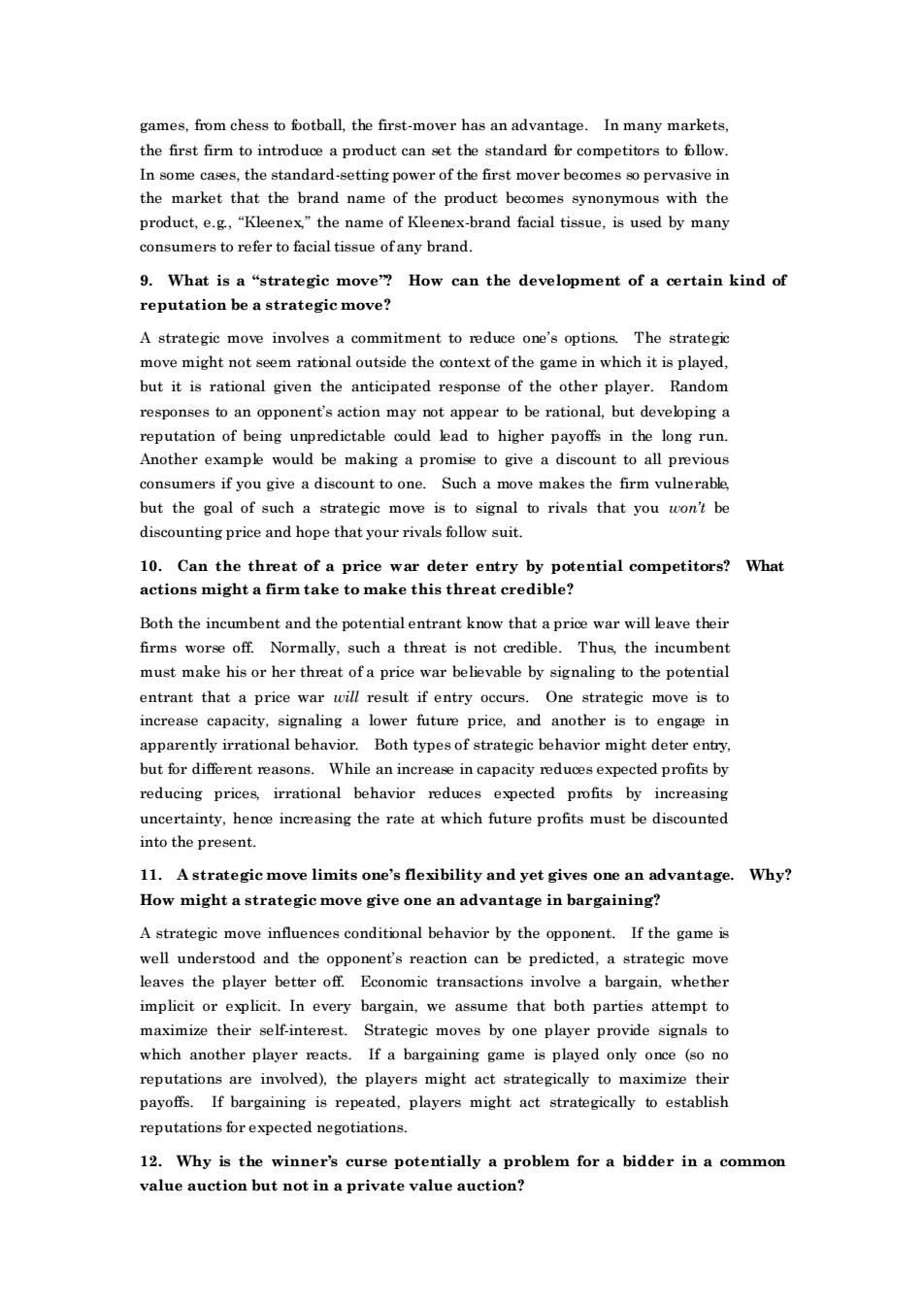正在加载图片...

games.from chess to football the first-mover has an advantage.In many markets the firstfirm to product canet the standard In some cases,the standard-setting power of the first mover becomes so pervasive in the market that the brand name of the product becomes synonymous with the product,e.g,"Kleenex"the name of Kleenex-brand facial tissue.is used by many consumers to refer to facial tissue ofany brand. 9.What is a "strategic move"?How can the development of a certain kind of reputation be a strategic move? A strategic move involves a commitment to reduce one's options The strateg move might not seem rational outside the context of the game in which it is played but it is rational given the anticipated response of the other player.Random responses to an opponent's action may not appear to be rational,but developing a reputation of being unpredictable oould lead to higher payoffs in the long run. Another exampl would be making a promise to give a unt to all p consumers if you give a discount toone.Such a move makes the firm vulnerabk but the goal of such a strategic move is to signal to rivals that you won't be discounting price and hope that your rivals follow suit. 10.Can the threat of a price war deter entry by potential competitors?What actions might a firm take to make this threat credible? Both the incumbent and the potential entrant know that a price war will leave their firms worse off Normally uch a threat is not crdibe.Thus the incumbent must make his or her threat ofa price war belevable by signalingto the potenti entrant that a price war will result if entry occurs.One strategic move is to increase capacity,signaling a lower future price,and another is to engage in apparently irrational behavior.Both types of strategic behavior might deter entry. but for different reasons.While an inc sein capacity reduces expected profits by reducing prices rrational behavio expected profits by increasin uncertainty,hence increasing the rate at which future profits must be discounted into the present. 11.A strategic move limits one's flexibility and yet gives one an advantage.Why? How might a strategic move give one an advantage in bargaining? A strategic move influences conditional behavior by the opponent.If the game is well understood and the reaction can be pre icted.a strategi e es the play transac a bargain, mphcit or explicit.In every bargain,we assume that both parties attempt to maximize their self-interest.Strategic moves by one plaver provide signals to which another player reacts.If a bargaining game is played only once (so no reputations are involved).the plavers might act strategically to maximize their payoffs.If bargaining is repeated,players might act strategically to establish reputations for expected negotiations 12.Why is the winner's curse potentially a problem for a bidder in a common value auction but not in a private value auction?games, from chess to football, the first-mover has an advantage. In many markets, the first firm to introduce a product can set the standard for competitors to follow. In some cases, the standard-setting power of the first mover becomes so pervasive in the market that the brand name of the product becomes synonymous with the product, e.g., “Kleenex,” the name of Kleenex-brand facial tissue, is used by many consumers to refer to facial tissue of any brand. 9. What is a “strategic move”? How can the development of a certain kind of reputation be a strategic move? A strategic move involves a commitment to reduce one’s options. The strategic move might not seem rational outside the context of the game in which it is played, but it is rational given the anticipated response of the other player. Random responses to an opponent’s action may not appear to be rational, but developing a reputation of being unpredictable could lead to higher payoffs in the long run. Another example would be making a promise to give a discount to all previous consumers if you give a discount to one. Such a move makes the firm vulnerable, but the goal of such a strategic move is to signal to rivals that you won’t be discounting price and hope that your rivals follow suit. 10. Can the threat of a price war deter entry by potential competitors? What actions might a firm take to make this threat credible? Both the incumbent and the potential entrant know that a price war will leave their firms worse off. Normally, such a threat is not credible. Thus, the incumbent must make his or her threat of a price war believable by signaling to the potential entrant that a price war will result if entry occurs. One strategic move is to increase capacity, signaling a lower future price, and another is to engage in apparently irrational behavior. Both types of strategic behavior might deter entry, but for different reasons. While an increase in capacity reduces expected profits by reducing prices, irrational behavior reduces expected profits by increasing uncertainty, hence increasing the rate at which future profits must be discounted into the present. 11. A strategic move limits one’s flexibility and yet gives one an advantage. Why? How might a strategic move give one an advantage in bargaining? A strategic move influences conditional behavior by the opponent. If the game is well understood and the opponent’s reaction can be predicted, a strategic move leaves the player better off. Economic transactions involve a bargain, whether implicit or explicit. In every bargain, we assume that both parties attempt to maximize their self-interest. Strategic moves by one player provide signals to which another player reacts. If a bargaining game is played only once (so no reputations are involved), the players might act strategically to maximize their payoffs. If bargaining is repeated, players might act strategically to establish reputations for expected negotiations. 12. Why is the winner’s curse potentially a problem for a bidder in a common value auction but not in a private value auction?